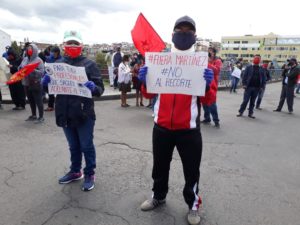People in Ecuador have taken to the streets again this week despite heightened risks of coronavirus over wildly unpopular economic reforms were reintroduced on May 19. Moreno backed down on the measures in October last year after protests caused such unrest that the government had to flee from the capital Quito to Guayaquil.

A number of organisations including the Confederation of Indigenous Nationalities of Ecuador (CONAIE), the Indigenous and Peasant Movement of Cotopaxi (MICC), The People’s Front, and the Unitary Front of Workers (FUT), called for the national mobilisation last week.
Protestors called for “employment, education and health for the people” in a wave of discontent and lack of faith in a government seen to be deepening the crisis in Ecuador.
“The fact that Moreno is announcing new measures in the middle of a pandemic is a concerning development and says a great deal about his failure to protect the population,” says Rebekah Hayden, a member of research and advocacy organisation, the Rainforest Action Group.
The measures will see education spending slashed, 12,000 public servants lose their jobs and more than 10 public companies close or merge, including the largest airline in Ecuador (TAME). Salaries of public servants would also be reduced and fuel subsidies axed.
Ecuador has been hard hit by Covid-19, with more than 37,000 confirmed cases and over 3000 confirmed deaths. Given that health care is limited in much of the country and testing has been scarce, the true figure is likely to be significantly higher.
“Many of these reforms, including fuel price rises, will see the poorest Ecuadorians and small-scale farmers hit the most. Closing public companies will lead to further unemployment, a disaster in a country that is already struggling with the huge impact of coronavirus on work and employment, on top of a high level of existing poverty.” Ms Hayden said.
“The reforms by the Ecuadorian government are part of IMF and World Bank mandates that seek to open Ecuador further to international investment, and pave the way for widespread copper and gold mining despite resistance from the population. The IMF loan was provisioned on foreign investment, particularly strategic mining projects such as SolGold’s proposed Cascabel mine which acts as collateral for the loans. Many of these mining projects are still being contested by locals who say they haven’t been consulted,” says Ms Rebekah Hayden.
“It is also concerning that Moreno’s measures came only a week after he announced that all mining restrictions were to be lifted, with military being used to protect their activities. The Rainforest Action Group is worried that the military will be used to push through mining operations in areas where there has been long-standing opposition to mining projects – some of which are currently being contested in court over claims they are illegal due to lack of consultation.
‘The new unrest adds to existing concerns about mining companies continuing to operate in indigenous territories and remote communities despite the risks of coronavirus. At Fruta del Norte, Miguel Gonzalez, the Mayor of Zamora, is concerned that transportation of ore will allow the virus to spread in the province,” Rebekah Hayden says.
“The government’s inability to act effectively in a crisis was made apparent when at least 550 bodies were not collected for up to eight days at Guayaquil, Ecuador’s main port, in April. The current debacle indicates that the government cannot ensure a safe environment for mining – particularly not in the midst of an epidemic,” Rebekah Hayden says.
Full release and contact details here: